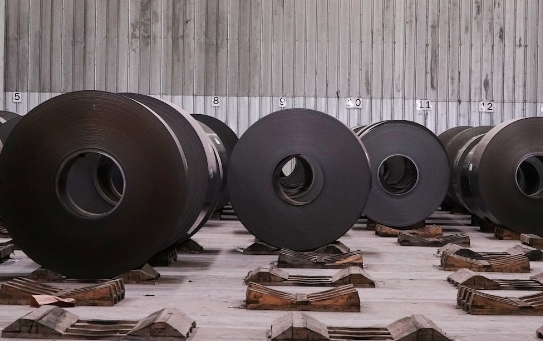
A general view of steel rolls in a factory in Blytheville, Arkansas, U.S., March 28, 2025.
Eoin Dinsmore, an analyst at Goldman Sachs, noted: “Higher prices are also likely to weigh further on U.S. steel demand from the manufacturing sector, which we already expect to contract this year.” Copper prices also climbed, reaching a near two-month high, as markets anticipated potential tariffs on this metal used in power and construction.
Europe, a key exporter of steel to the U.S., faced challenges. The U.S. accounted for about one-fifth of European steel exports outside the EU. Bastian Synagowitz at Deutsche Bank stated: “The risk for the European market, as well as other regional markets, is that some of the trade flow could reroute.” Germany’s Salzgitter, a major steelmaker, highlighted the adverse impact on European industry.
In Asia, South Korea, the fourth-largest steel exporter to the U.S. in 2024, saw shares of major steelmakers like POSCO and Hyundai Steel drop by 3%, while SeAH Steel Corp fell 8%. South Korea’s Industry Ministry held an emergency meeting with executives from POSCO and Hyundai Steel to address the tariffs’ impact. A South Korean industry executive, who requested anonymity, told Reuters: “It will be a burden to exporting companies if there are no additional steel price increases in the U.S.”
In Vietnam, steel companies such as Hoa Sen Group, Nam Kim Steel, and Vietnam Steel Corp experienced share declines between 2.7% and 3.4%. In India, a significant aluminium exporter to the U.S., B.K. Bhatia, director-general at the Federation of Indian Mineral Industries, said: “This is going to have a detrimental impact.” He expressed hope that ongoing negotiations would lead to reduced tariffs.
U.S. steelmakers, including Nucor, Cleveland-Cliffs, and Steel Dynamics, saw share prices rise between 11% and 24% in early trading. Mark Duffy, president of the American Primary Aluminum Association, commented: “For decades, subsidized foreign producers have hollowed out domestic aluminum manufacturing.” The tariffs were welcomed by U.S. producers as a measure to support local industry.
Analysts, including Chelsea Ye from McCloskey, expressed skepticism about the tariffs’ full implementation, suggesting: “I think the final result will be far lower than initially projected, especially concerning its duration.” Meanwhile, South Korea has sought exemptions during trade talks, and Hyundai Steel plans to build a $5.8 billion factory in Louisiana by 2029 to navigate the tariff environment.